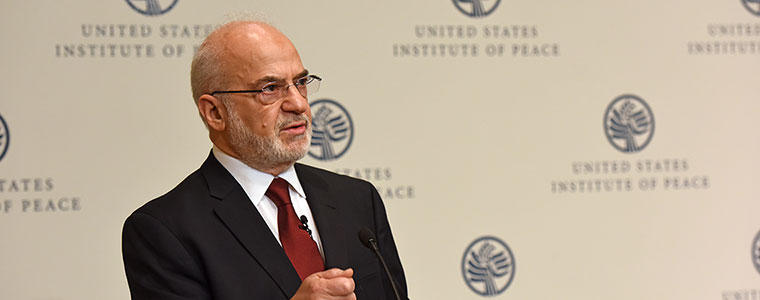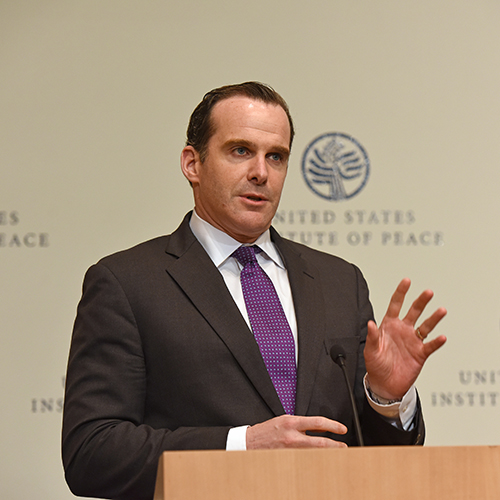'Complex Challenge' of Retaking Mosul Adds Urgency to Reconstruction Planning
Iraqi Foreign Minister Ibrahim al-Jaafari and U.S. envoy Brett McGurk today emphasized the urgency of planning and financing Iraq’s recovery from the ISIS onslaught as areas the extremist group had controlled are recaptured more quickly than expected. The two spoke at the U.S. Institute of Peace in advance of an international conference of donors to Iraq convening in Washington tomorrow and a meeting the following day of the global coalition backing the fight.

Recent quick victories in Iraq against the self-styled Islamic State extremist group and preparations for achieving the same in the country’s second-largest city, Mosul, heighten the urgency of ensuring a more durable peace so the military gains won’t be lost again in the future. The risks looming over these devastated areas include renewed discontent over basic services or governance or over a cycle of revenge because of the deep distrust that ISIS leaves in its wake.
“Achieving victory for the Iraqi people is not a national victory; it is an international and global victory … because Daesh is a global challenge.” – Iraqi Foreign Minister Ibrahim al-Jaafari
“Iraq is on the front line of the confrontation,” al-Jaafari told an overflow audience in an event that also was webcast. The United Nations estimated in January that almost 19,000 Iraqi civilians had been killed between January 2014 and October 2015. More recently, a truck bombing killed almost 200 people in a busy market area in Baghdad’s Karrada neighborhood during the Muslim holiday of Eid al-Fitr, one of a string of deadly suicide attacks in Iraq. And recent attacks in France, Turkey and elsewhere apparently were inspired by ISIS. “Iraq is not defending itself only, but defending the whole world,” the minister said.
Last month’s recapture of Falluja, just west of Baghdad, from ISIS, also known as ISIL, is further evidence of the determination of the Iraqi people and their security forces to battle the extremists, the foreign minister said. At the same time, the government of Prime Minister Haider al-Abadi is pursuing economic and governance reforms to restore stability and establish more inclusive politics in the divided country, al-Jaafari said.

Mosul “is the last hideout for Daesh in Iraq,” al-Jaafari said, using an Arabic acronym for the group. “Achieving victory for the Iraqi people is not a national victory; it is an international and global victory … because Daesh is a global challenge.”
But McGurk, the U.S. special presidential envoy to the Global Coalition to Counter ISIL, said that, although the military campaign is “ahead of where we thought it would be at this time,” Mosul is “one of the most complex challenges ahead of us.”
Mosul is where ISIS leader Abu Bakr al-Baghdadi declared his “phony caliphate two years ago” McGurk said. “It is where we will put one of the nails into the coffin of that phony caliphate.”
More than a million residents still live in the oil-rich area, and the diverse population and territorial disputes between Iraq’s central government and the Kurdistan Regional Government hugely complicate any prospects of resolving underlying conflicts.
What Comes After 'Daesh'
The foreign and defense ministers from more than 40 countries in the coalition will meet in Washington this week to discuss the campaign against ISIS in Iraq, Syria, Libya and elsewhere. They aim “to dry up” the networks that fuel the extremist group with foreign fighters, financing and propaganda, McGurk said.
“But we’re also focused not just on defeating Daesh. We’re focused on what comes after Daesh,” he said.
Questions include who will hold the ground, what resources will be available for the humanitarian response and what is the plan for stabilizing the area to get people back into their homes. The international community has established U.N. funds for immediate stabilization and for longer-term reconstruction.
McGurk cited the need to pay attention to “not just the restoration of electricity and getting police back in the streets, but the psychological trauma of what the society has gone through.”
USIP President Nancy Lindborg, in introducing McGurk, outlined the imperative of focusing at the 24-nation donors conference on the possibilities of reconciling Iraq’s divided communities, to avoid the need to fight the same battle again—and deploy international troops again—in the future.
“The question is how do we help the Iraqi people return home, and importantly, how do the Iraqi people avoid cycles of violence that could require repeated military operations, especially as they cope with the aftermath of an occupation that has torn apart the social fabric and left communities deeply suspicious of each other,” Lindborg said.
USIP has worked with and trained Iraqis to facilitate successful negotiations in a half dozen communities in the past 10 years. In 2015, after Iraqi forces recaptured the city of Tikrit from ISIS control, this Network of Iraqi Facilitators and a USIP-supported non-governmental organization called SANAD for Peacebuilding helped tribal sheikhs work with the Iraqi government to prevent a cycle of revenge over a massacre that ISIS had committed the year before at the nearby Camp Speicher military base. The mediators helped restore trust among community and national leaders and develop agreements for accountability, the return of displaced people and restitution for atrocities.
Replicating Results
“These results can be replicated,” Lindborg said. “Iraq’s diverse communities must and can learn to live together.” Local agreements also eventually could support a national reconciliation process, she said.
McGurk said the military coalition spent “tens of millions of dollars” to restore essential local services in Tikrit, and the Iraqi government returned local police officers to the streets. About 158,000, or 90 percent of residents who fled the area when ISIS took over have now returned, according to the International Organization for Migration.
“If you look historically [at] returning populations to their homes after a conflict like this, that is totally unprecedented,” McGurk said. More than 700,000 Iraqis have returned to their homes in areas that had been controlled by ISIS, he said, and security forces have recaptured about half the territory that ISIS once controlled.
The Iraqi security forces haven’t lost a battle in more than a year and are showing increasing confidence, professionalism and capacity, he said. In preparation for the military campaign to retake Mosul, Iraqi government forces and the coalition recently captured a major air base just south of the city that is now being used as a staging area for the rest of the operation.
“I’m encouraged because the military side of the campaign is now coming together,” McGurk said. “We’re determined, as everybody knows, to do all we can to defeat ISIL, or Daesh, and we will defeat them.”